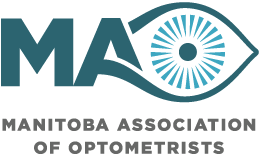Optometrists are primary health care professionals trained to examine, diagnose, treat, manage, and prevent diseases and disorders of the visual system. In addition to prescribing glasses and contact lenses, optometrists can recommend eye health hygiene and prescribe medications to treat infections, inflammations and allergies; treat eye injuries including foreign body removal; and assess unusual or sudden vision changes and conditions causing eye pain. Optometrists also assist in identifying general health conditions that are often first detected through an eye exam.
A career in optometry can offer routine and flexible working hours, a good income, and the option to own your business. There are approximately 3,000 optometrists practicing in Canada, including approximately 160 in Manitoba. Optometrists usually begin practise as an associate at one or more existing practices. Particularly new optometrists will often split their time between a few different optometry clinics. One they are established, many optometrists will purchase a practice, either on their own, with a partner, or with a group of partners; and may also run an optical dispensary. Optometrists usually have staff including optometric assistants and trained optical staff.
Optometrists typically complete a minimum of 7-8 years of post-secondary education to obtain their professional designation, OD (Optometric Doctorate). This typically consists of a B.Sc. followed by a 4-year Doctor of Optometry degree program. Upon completion of an OD degree, optometrists must successfully complete the national board exam, called the CACO (Canadian Assessment of Competence in Optometry). Optometrists must also complete any requirements to register in the province or territory where they intend to practise. Legislation requires that all optometrists must be registered with the regulatory body in any jurisdiction where they will practise; in order to practise in Manitoba, optometrists must be registered with the Manitoba Association of Optometrists. For more information on MAO membership, click here.
The University of Waterloo’s School of Optometry and Vision Science is the only English language institution offering a Doctor of Optometry program in Canada. A French language Doctor of Optometry program is offered at the Université de Montréal. The University of Waterloo also offers an International Optometric Bridging Program in order for internationally educated optometrists to begin practise in Canada. There are a number of accredited optometric institutions in the United States that are recognized in Canada, a list can be found here.
The cost of completing an OD degree in Canada ranges from $60,000-70,000; cost in the United States ranges from $175,000-$200,000. Loans, bursaries, or scholarships may be available to assist students in covering education costs. MAO’s A. H. Basman, OD Scholarship is a scholarship awarded to four Manitoba students annually; it’s offered to one student in each of years 1-4 of optometry school.
Optometrists can expect to earn a good income. Income is influenced by a number of factors including provincial healthcare coverage, practice location, services provided, etc. There are also costs involved in setting up a new practice, such as equipment, building costs, inventory, etc.
